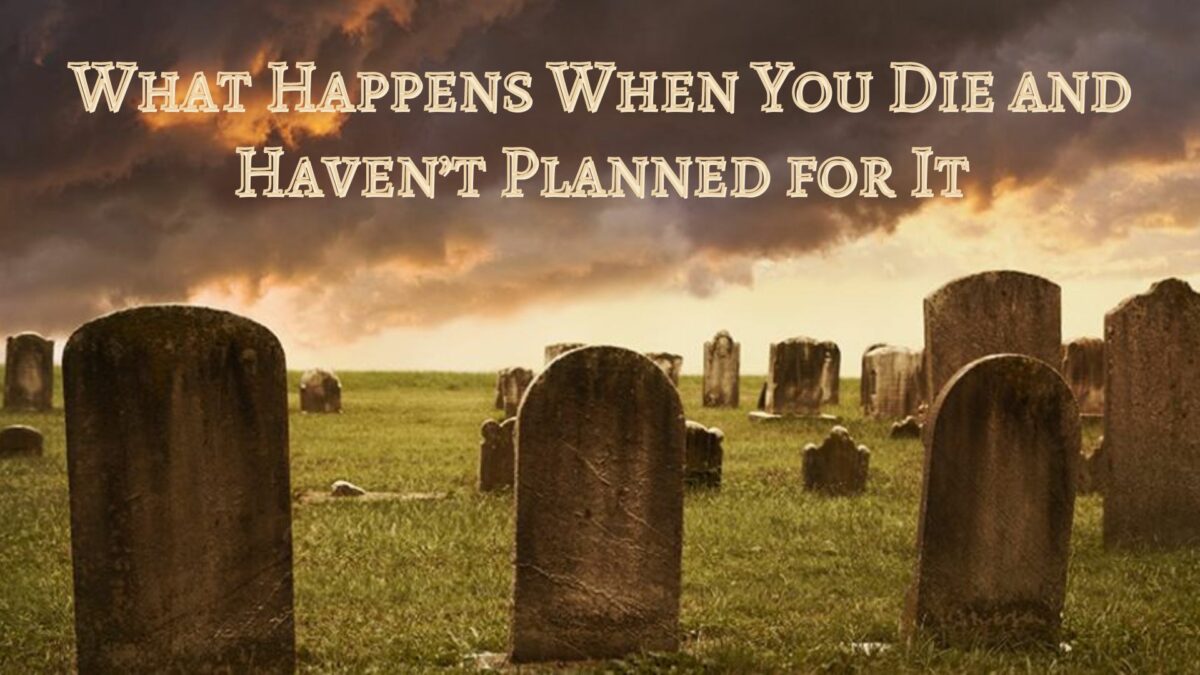“It’s not that I’m afraid to die, I just don’t want to be there when it happens.”
–Woody Allen
I know that the idea of facing your mortality is a difficult one. Monkey Brain wants to think that he’s going to live forever, and few things are more certain to get him throwing bananas than to contemplate a world where he’s not around.
Yet, I’ve had friends in the past couple of years have to pick up the pieces when loved ones died unexpectedly and left them to pick up the pieces. From just trying to find the will to determining where all the assets were to clearing probate to spending months and months cleaning out random junk drawers just to ensure that no important documents went into the Dumpster, the failure to plan extended the sorrow and suffering for those who were left behind.
I’ve seen it in my own family. When my grandmother died, my aunt had to spend six months going through filing cabinets, stacks, and piles trying to piece together the story of not only my grandparents’ finances but also the important – both from a financial and a sentimental perspective – paperwork and artifacts to make sure that family heirlooms didn’t get squashed in the garbage truck.
It’s harrowing. It sucks.
The “beneficiaries” of the estate have just had a loved one pass away, a traumatic and wrenching experience itself, and they have to clean up a mess. Not only that, they have to take time away from their lives to do so.
All because of a failure to plan.
What happens when you step out in front of the beer truck?
If you’re married and you’ve been a dutiful spouse who works together with your love so that, every month, you’re going through the budget and the investments together, it shouldn’t be overly difficult to get everything transferred into the survivor’s name. That’s what happened when my grandfather died. My grandmother took the death certificate to the county and presto, changeo, everything was done. It was surprisingly easy for her.
If you’re the widow/widower and you pass without having appropriately planned, you introduce chaos into your kids’ or siblings’ lives.
First, they have to deal with the shock that you’re gone. Then, slowly, they have to start piecing everything together. How to get into the house? Where should they look for documents? What about the step parent? Should he/she claim spousal death benefits on Social Security or not? Was there insurance? Who was the beneficiary? What about retirement plans? Pensions? Who gets Aunt Myrtle’s Wedgewood china? Do they bury you? Cremate you? Put you in an urn?
They have to fly in and try to figure things out. They usually have only planned to take a week off from work before going back in. If your life was a mess, there’s no possible way they can get everything done in a week. There’s probate, mail, correspondence, bills, banking, and a ton of other items to sort out all while planning and then going to a funeral.
They’re left flailing and frustrated and probably a bit angry that Mom or Dad couldn’t get their affairs in order and have left it all to the kids.
Is that the memory you want to leave?
Estate planning is, for a vast majority of people, not difficult, and it’s very important. Some in the industry want to make it this big, vast, dark secret so they can charge you thousands of dollars to do. Yes, if you’re extremely wealthy, then it probably does require several thousands of dollars and lots of attorney hours to make sure you have an adequate estate and trust plan.
For the rest of us, it’s not nearly that difficult.
Be a responsible adult. Get your act together. Organize your affairs and leave detailed instructions so that when you forget to look left, then right, then left again before stepping out in front of the beer truck, a loved one knows what to do and doesn’t have a months-long burden of putting your old life together again.
Author Profile
- John Davis is a nationally recognized expert on credit reporting, credit scoring, and identity theft. He has written four books about his expertise in the field and has been featured extensively in numerous media outlets such as The Wall Street Journal, The Washington Post, CNN, CBS News, CNBC, Fox Business, and many more. With over 20 years of experience helping consumers understand their credit and identity protection rights, John is passionate about empowering people to take control of their finances. He works with financial institutions to develop consumer-friendly policies that promote financial literacy and responsible borrowing habits.
Latest entries
 Low Income GrantsSeptember 25, 2023How to Get a Free Government Phone: A Step-by-Step Guide
Low Income GrantsSeptember 25, 2023How to Get a Free Government Phone: A Step-by-Step Guide Low Income GrantsSeptember 25, 2023Dental Charities That Help With Dental Costs
Low Income GrantsSeptember 25, 2023Dental Charities That Help With Dental Costs Low Income GrantsSeptember 25, 2023Low-Cost Hearing Aids for Seniors: A Comprehensive Guide
Low Income GrantsSeptember 25, 2023Low-Cost Hearing Aids for Seniors: A Comprehensive Guide Low Income GrantsSeptember 25, 2023Second Chance Apartments that Accept Evictions: A Comprehensive Guide
Low Income GrantsSeptember 25, 2023Second Chance Apartments that Accept Evictions: A Comprehensive Guide

